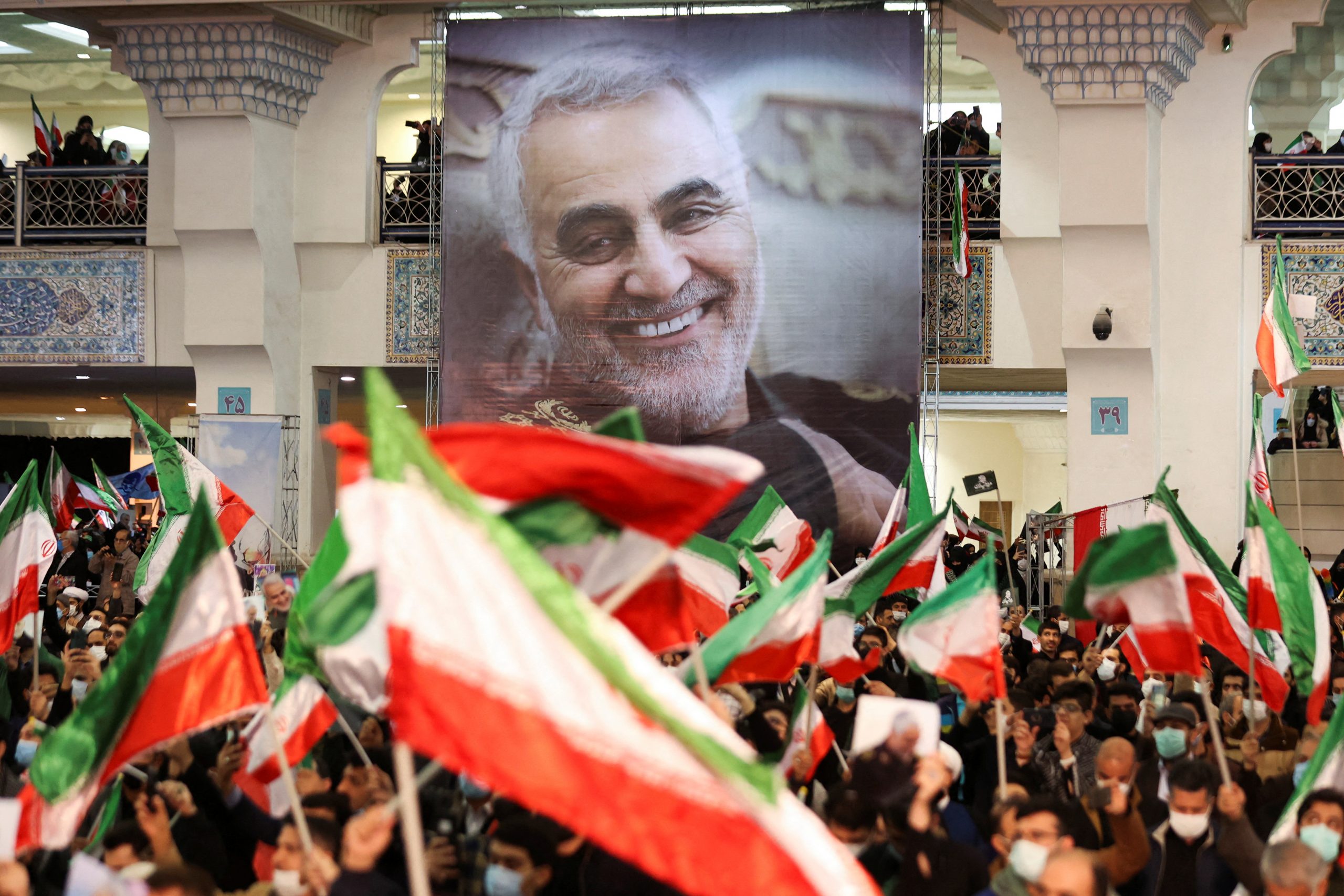
Willie R. Tubbs, FISM News
[elfsight_social_share_buttons id=”1″]
Seven-hundred-thirty-eight days after his death, Iranian Gen. Qasem Soleimani still stands as a rallying point for both Iranian leaders and pro-Iranian forces in the Middle East.
Monday, as Iran commemorated the two-year anniversary of Soleimani’s death at the hands of a U.S. drone strike in Iraq, the president of Iran threatened revenge against former U.S. President Donald Trump while pro-Iranian players elsewhere protested, launched a failed drone attack against U.S. troops, and temporarily hacked an English-language Israeli newspaper’s website.
As first reported by Al Jazeera, Iranian President Ebrahim Raisi called Trump a “killer” and promised the former American president would suffer “qisas,” or “retaliation in kind” for having okayed the attack that ended Soleimani’s life.
Raisi said Iran would relent if Trump, former Secretary of State Mike Pompeo, and other U.S. military leaders were tried, found guilty, and punished by the United States.
Al Jazeera quoted Raisi as saying, “don’t doubt, and I tell this to all American statesmen, that the hand of revenge will come out of the ummah’s [nation’s] sleeve.”
A subsequent report by Reuters provided additional remarks from Raisi.
“If Trump and Pompeo are not tried in a fair court for the criminal act of assassinating General Soleimani, Muslims will take our martyr’s revenge,” Raisi said. He later added, “The aggressor, murderer and main culprit – the then president of the United States – must be tried and judged under the [Islamic] law of retribution, and God’s ruling must be carried out against him.”
As of this writing, the Biden administration had not yet responded to the threat on the life of a former U.S. president. Neither the White House not Department of State have issued a response, and the verified twitter accounts for President Biden and Secretary of State Antony Blinken were also void of comment on the matter.
Former President Trump has also not yet issued a response.
Meanwhile, in Baghdad, Al Jazeera reported that thousands of protestors chanted “death to America” while demanding a full withdrawal of the remaining U.S. troops from Iraq. At the same time, according to Reuters, a pair of armed drones were shot down before they could strike a military base at which U.S. forces were being housed.
No one was hurt in the strike and the drones were shot down without incident, a spokesperson for the U.S. coalition told Reuters. No one has claimed responsibility for the attack.
The most successful pro-Soleimani action on Monday occurred virtually when someone hacked the Jerusalem Post’s website. For a short time, the paper’s home page contained imagery related to Soleimani and a threat to Israel and its nuclear facilities. The paper has since restored its home page.
Not everyone is convinced the attacks were purely motivated by love of Soleimani. Yaron Rosen, a retired Israeli brigadier general and former cyber security officer, told the Jerusalem Post the hack was likely meant to sway public opinion as Iran engaged in nuclear talks in Vienna.
“Any part of Israel’s media, whether it be print, Internet or TV, is part of the media megaphone speaking to the Israeli public… We are in the midst of nuclear discussions,” Rosen told the Post. “Both sides are probably doing the best they can with whoever they can to influence things. This is part of influence operations.”
Similarly, Iran’s threats against Trump can be viewed as little more than empty rhetoric.
It is highly unlikely that the Biden administration or U.S. court system will be coerced into prosecuting the former president or members of his cabinet, and Iran lacks the ability to force the United States’ hand militarily or diplomatically. Pro-Iranian terrorists would have to break through Secret Service and U.S. defenses to enact revenge.
However, Iran can grab headlines and attempt to sway some element of the U.S. public or international audience. Likewise, pro-Iranian militias and terrorists cannot overcome the might of the U.S. military, but they can prove nuisance enough to chip away at public opinion.
Even in death, Soleimani, who for 22 years served as the head of Iran’s Quds Force, the branch of the Iranian military that specializes in intelligence and unconventional warfare, remains as polarizing as ever.
Iranians hail him as a military hero and martyr who led the fight against ISIL in Iran. The U.S., under both the Obama and Trump White Houses, on the other hand, treated him as an agent of evil who supported terrorists and helped the likes of Syrian President Bashar al-Assad suppress the freedoms of residents in the Middle East.
Soleimani was killed Jan. 3, 2020, by a U.S. drone strike near the Baghdad International Airport.
